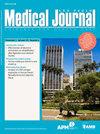1型强直性肌营养不良的非运动症状和体征
IF 1.6
4区 医学
Q2 MEDICINE, GENERAL & INTERNAL
引用次数: 0
摘要
1型肌强直性营养不良症(DM1)是一种遗传性疾病,表现为神经肌肉表现和多系统临床反应,如心脏和呼吸系统疾病、睡眠障碍和吞咽障碍等。这是成人中最常见的肌肉萎缩症。目的:确定在Clínicas巴西联邦大学本文章由计算机程序翻译,如有差异,请以英文原文为准。
Non-motor symptoms and signs of Myotonic Dystrophy type 1
Introduction: Myotonic Dystrophy Type 1 (DM1) is a genetic disease that presents neuromuscular manifestations and multisystemic clinical repercussions, such as cardiac and respiratory disorders, sleep disorders and impaired swallowing, among others. It is the most common muscular dystrophy in adults. Objectives: To determine the epidemiological profile of patients with DM1 treated at the Neuromuscular Diseases Outpatient Clinic of the Complexo Hospital de Clínicas da Universidade Federal do Paraná (CHC-UFPR). Methods: A total of 27 individuals diagnosed with DM1, assisted at the Neuromuscular Diseases Outpatient Clinic of the CHC-UFPR, were evaluated between May 2021 and March 2022. For this purpose, their medical records with the clinical data were analyzed. Results: The sample consisted of 78% male subjects with mean age at onset of symptoms of 27.6 ± 10.8. The most frequent muscular manifestations were myotonia (100%), weakness of the distal muscles of the upper (96.3%) and lower (96.3%) limbs, myotonic facies (92.6%). The most common non-motor manifestations were excessive daytime sleepiness (74.1%), frontal baldness (66.7%), pharyngeal globus (62.9%), choking or coughing during and/or at the end of swallowing (62.9%), cataracts (59.2%), dysphagia (55.6%), chest pain (55.6%), cognitive impairment (44.4%), dyspnea (44.4%). Of the patients, 22.2% had a previous history of pneumonia. Conclusion: The DM1 patients in this study presented an epidemiological profile consistent with that described in the literature. Non-motor manifestations are common and should be investigated, since complications such as bronchopneumonia are important causes of mortality in these patients and may negatively impact the quality of life. Therefore, DM1 patients require multidisciplinary monitoring and evaluation.
求助全文
通过发布文献求助,成功后即可免费获取论文全文。
去求助
来源期刊

Sao Paulo Medical Journal
医学-医学:内科
CiteScore
2.20
自引率
7.10%
发文量
210
审稿时长
6-12 weeks
期刊介绍:
Published bimonthly by the Associação Paulista de Medicina, the journal accepts articles in the fields of clinical health science (internal medicine, gynecology and obstetrics, mental health, surgery, pediatrics and public health). Articles will be accepted in the form of original articles (clinical trials, cohort, case-control, prevalence, incidence, accuracy and cost-effectiveness studies and systematic reviews with or without meta-analysis), narrative reviews of the literature, case reports, short communications and letters to the editor. Papers with a commercial objective will not be accepted.
 求助内容:
求助内容: 应助结果提醒方式:
应助结果提醒方式:


